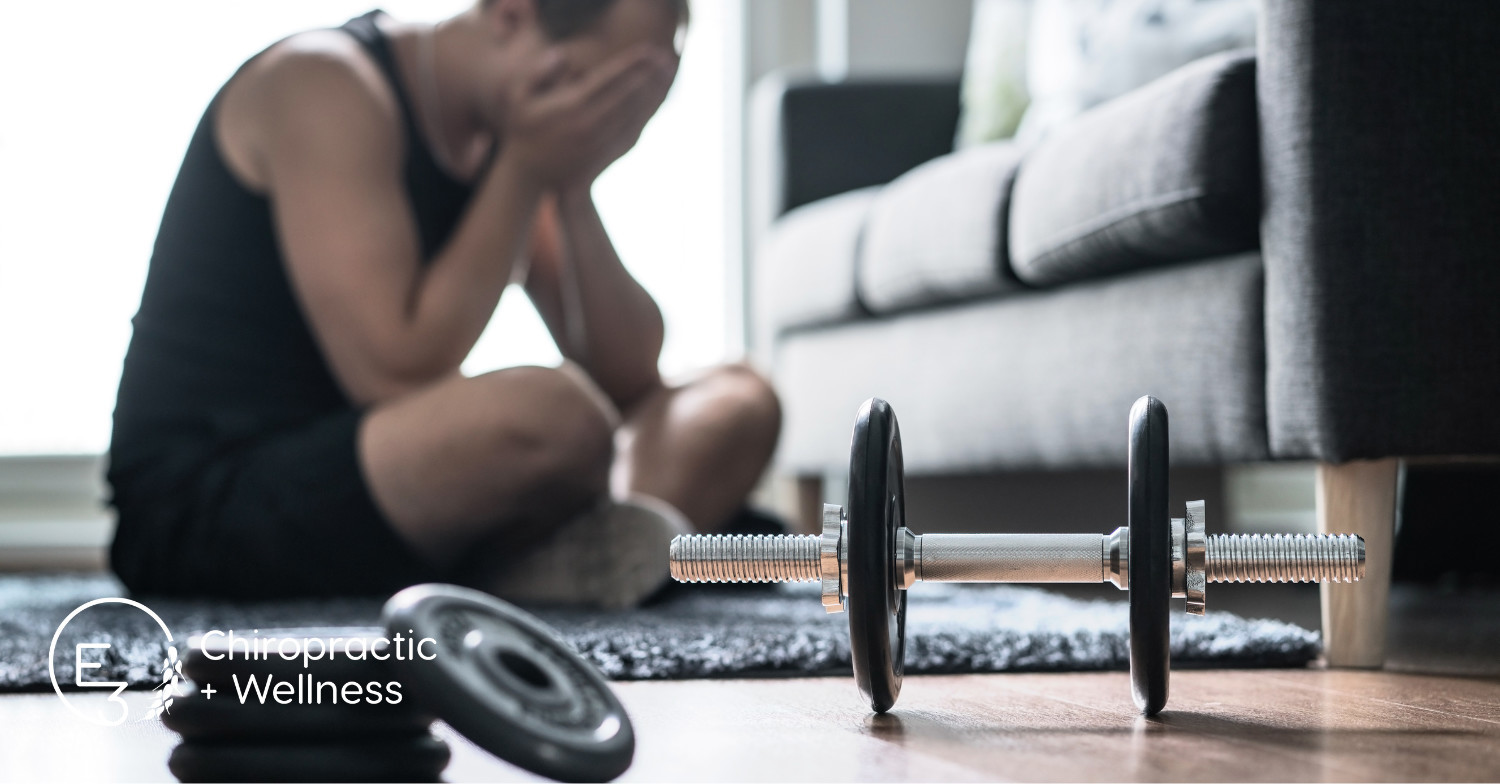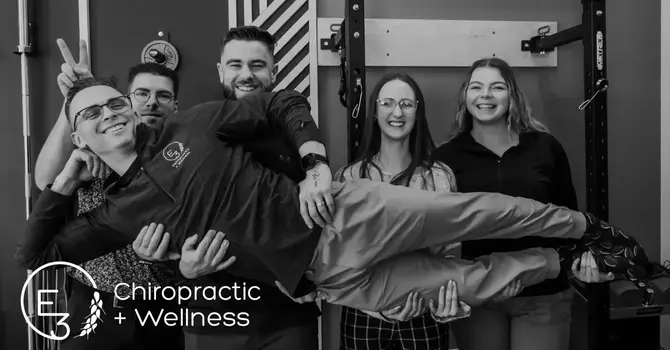
You’re eating clean, hitting your workouts consistently, following your rehab plan—and still not seeing the progress you expected. Maybe you're dragging through training sessions, dealing with nagging injuries that won’t heal, or feeling like your performance has hit a wall.
Sound familiar?
What many active people overlook is one major factor that can derail both recovery and performance: stress.
At E3 Chiropractic + Wellness, a trusted Saskatoon Chiropractor for active adults, we see this all the time. Clients doing all the right things—except managing their stress levels. In this blog, we’ll explain how stress affects your body, your workouts, your healing process, and what you can do about it.
You Can’t Out-Train Stress
Stress isn’t just about feeling overwhelmed at work or losing sleep. It’s a physiological response that impacts nearly every system in your body. Whether it’s physical (like a tough workout), emotional (like relationship tension), or mental (like job pressure), your body doesn’t differentiate. It responds the same way—by activating the sympathetic nervous system, also known as the “fight or flight” mode.
This stress response increases heart rate, blood pressure, and muscle tension while shutting down non-essential functions like digestion, immune response, and—most critically—recovery and repair.
If your body is constantly in fight-or-flight mode, it simply can’t shift into the parasympathetic “rest and digest” state, which is where all healing, rebuilding, and true progress happens.
How Stress Impacts Recovery
1. Slower Tissue Healing
When you’re stressed, your body releases cortisol—a hormone that in small amounts helps with energy and inflammation. But chronically elevated cortisol suppresses immune function and slows the production of collagen, a key component in tissue repair.
What it looks like: That minor muscle strain takes weeks to heal. Soreness lasts longer than it should. Rehab exercises don’t seem to be helping.
2. Increased Muscle Tension
Stress causes muscles to tighten, especially in the neck, shoulders, and low back. This not only contributes to chronic pain, but it also creates imbalances and restrictions that affect movement patterns.
What it looks like: You feel stiff in your warm-ups. Your range of motion is limited. You’re more prone to overuse injuries.
3. Reduced Sleep Quality
Recovery doesn’t happen in the gym—it happens while you sleep. But if your nervous system is ramped up from stress, it can interfere with deep, restorative sleep stages like REM and slow-wave sleep, which are essential for muscle recovery and hormonal regulation.
What it looks like: You’re tossing and turning at night. You wake up feeling unrefreshed. Your progress stalls even though your training hasn’t changed.
4. Poor Nutrient Absorption
Chronic stress can impair digestion and gut function, meaning even if you’re eating well, your body may not be absorbing the nutrients it needs for recovery and energy.
What it looks like: You’re fatigued, inflamed, and your joints ache even with a clean diet.
How Stress Affects Performance
Let’s talk about what happens to your workouts and athletic output when stress is high.
1. Decreased Strength and Power Output
Stress alters the way your brain communicates with your muscles. Your motor control becomes less precise, reaction times are slower, and your strength output can drop.
In real life: You’re missing lifts you normally make. Your coordination is off. Your explosive movements feel sluggish.
2. Higher Injury Risk
Muscle tension, altered movement patterns, poor sleep, and fatigue from stress all add up to one thing: a body more prone to injury.
What we see at E3: Runners coming in with shin splints. CrossFitters tweaking their backs on deadlifts. Athletes dealing with recurring shoulder or hip issues that just won’t quit.
3. Mental Fatigue and Motivation Loss
Stress doesn’t just affect your body—it drains your mental reserves. Your ability to focus, push through tough training, and stay consistent all take a hit.
What it looks like: You skip more workouts. You feel “off” at the gym. You start questioning your goals or feel unmotivated even though you love being active.
Managing Stress for Better Results
The good news? You don’t need to eliminate all stress—you just need to manage it more effectively. Here’s how.
- Prioritize Recovery as Much as Training
Rest days, mobility work, and sleep aren’t optional—they’re where the gains happen. Build structured recovery into your plan.
- Incorporate Parasympathetic Activities
Daily practices that stimulate the parasympathetic nervous system can help your body shift into recovery mode.
Try this:
Deep breathing exercises (box breathing, 4-7-8 breathing)
Meditation or mindfulness apps
Gentle movement like yoga or walking
Spending time outdoors or in quiet spaces
- Improve Sleep Hygiene
Quality sleep is your secret weapon. Aim for 7–9 hours a night and consider:
A consistent bedtime
Limiting screens an hour before bed
Keeping your room cool and dark
- Get Support for Pain and Imbalances
When stress and injuries collide, your body needs expert help to break the cycle. That’s where E3 Chiropractic + Wellness comes in.
How E3 Chiropractic + Wellness Can Help
As a top-rated Saskatoon Chiropractor for active adults, we take a comprehensive approach that doesn’t just treat pain—it addresses the underlying dysfunction and lifestyle factors contributing to it.
Our E3 Approach includes:
Evaluate: We identify what’s not moving well, what’s compensating, and what’s overworked.
Eliminate: We use hands-on care and targeted rehab to reduce pain and reset movement patterns.
Empower: We give you the tools and guidance to strengthen your body, manage stress, and optimize performance.
Whether you're training for a competition or trying to stay active without pain, our goal is to help you thrive—not just survive.
Final Thoughts: Stress Isn’t Just Mental
If you’ve hit a plateau in your training, are struggling with recurring injuries, or feel like you’re constantly “recovering” but never refreshed—look at your stress.
It’s not just in your head. It’s in your muscles, your sleep, your digestion, and your nervous system. And left unchecked, it can derail even the most dedicated athlete.
At E3 Chiropractic + Wellness, we help you take back control. With expert chiropractic care, functional rehab, and strategies to manage stress, we’ll help you move, perform, and live better.
Click HERE if you're ready to stop spinning your wheels and start making real progress? Book your discovery call with E3 Chiropractic + Wellness today.





